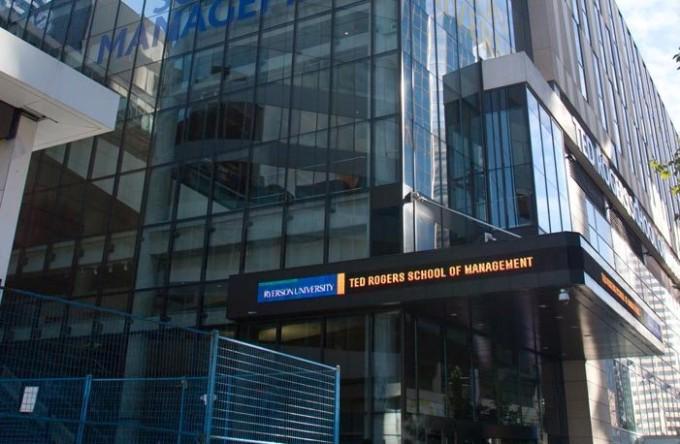It’s taken nearly six years, but the Ted Rogers School of Management is hoping an elusive business school accreditation will finally be theirs. Michael Chu reports
The Ted Rogers School of Management (TRSM), now Canada’s largest English-speaking business undergraduate school by enrollment, is trying to shed its “Rye High” image by gaining an internationally renowned business school accreditation.
The Association to Advance Collegiate Schools of Business (AACSB) evaluates the quality of the faculty, student retention and support, the relevance of the curriculum and many other factors, giving accreditation to schools that meet the criteria of the association.
“It [would] put the TRSM amongst the best business schools in the world,” says Ken Jones, dean of the TRSM.
Though the process initially began during the 2004-2005 school year, Ryerson will not find out until April of next year whether accreditation will be granted.
The University of Toronto, Queen’s University, the University of Alberta and the University of British Columbia have already been AACSB certified.
““They put a lot of emphasis on faculty qualification and research,” explained Dr. Wendy Cukier, associate dean academic at the TRSM, and the person responsible for spearheading the initiative.
“Our faculty today looks more like the faculty in a traditional high-quality business school than it did five years ago.”
In fact, 53 per cent of the faculty held PhDs in 2005 — a number that is now up to almost 78 per cent.
And because the accreditation is renewed every five years, it forces a high level of accountability on the part of the TRSM.
“It imposes on the faculty and staff a process of continuous improvement,” said Jones.
Meanwhile, the school has made student retention an increased focus, with peer tutoring and resource programs being introduced to further engage and support business students.
This has also resulted in the creation of BUS 100, Strategies for Success — a mandatory course for all students entering full-time studies at the TRSM.
It was developed to help incoming students gain skills to succeed in the business program, and to help make their university experience more holistic.
“It was an easy way to meet people. They can relate to what you are going through,” says Daniel Banach, third-year marketing major. “I kept in touch with people from that class.”
Perhaps more importantly, some classes have been modified to ensure students do not drop out when faced with the program’s more difficult courses.
In an attempt to counter historically high failure rates, the TRSM split the introductory financial and management courses into separate offerings for the 2009-2010 school year. One catered to the general business stream, while the other was intended specifically for students hoping to pursue an accounting major.
“We recognized what you teach and how you teach it could be different for those two groups,” says Cukier.
Vy Ngo, a second-year accounting major, was one of the first to take the split-stream course. “The final exam and midterm were much more harder.”
However, there are additional benefits for potential students. Master’s in Business Administration (MBA) programs generally tend to attract students internationally, and have the most to gain from the AACSB accreditation.
Aaron Byrne, fourth-year marketing student is planning to get his MBA in the near future and considers the benefits of getting it at an AACSB accredited school.
“If Ryerson got the accreditation I would do my MBA here,” Byrne says.
But as the TRSM continues to strive towards gaining this accreditation, some students are concerned the school will lose its hands-on learning approach.
Kristle Alfarero, second-year accounting major, transferred from the University of Toronto because of Ryerson’s reputation for having a practical curriculum.
“[We] were spending all this time memorizing these formulas,” said Aflarero. “It wasn’t very practical at all.
“There’s only so much theory you can apply. If you don’t know how to use the theory, what’s the point?”
However, Jones is quick to point out that AACSB guidelines don’t specify what the school must teach — only that what is learned meets a particular standard. The accreditation process won’t impact the style of learning students have come to expect.
Meanwhile, Jones can’t identify exactly how much it has cost Ryerson to implement the changes required for the accreditation process, but is optimistic the overall improvements are worth it in the long run.
“I think we’ve made huge strides over the last five years,” Jones says. “It’s not a slam dunk by any means, but their standards have helped us to improve.
Photo: Matthew Braga










Leave a Reply